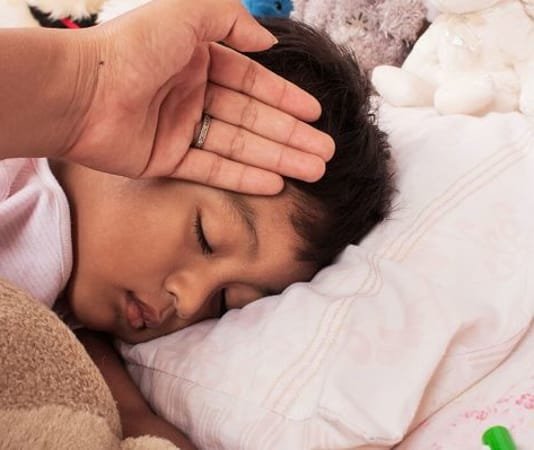
When your child has a fever, all sorts of thoughts run through a parents mind; especially if you are a first-time parent. It seems that no matter what you do or how careful you are you cannot escape your child getting ill. It is a fact of life.
As a parent, you need to know what to do when it happens.
You can find all kinds of thermometers to choose from, from the standard thermometer that you put in their mouth or under their armpit to the new temporal artery scanners. It is your choice, but a good digital thermometer is good enough to have on hand and cheaper.
The most accurate way to measure is using a rectal thermometer for babies and the younger children. If you don’t like doing this, then use whatever measuring device that you feel most comfortable. When your child is older, the oral thermometer is the most accurate if your kid can tolerate it.
When You Should Worry
A fever for an infant or child is defined as a temperature over 100.4 F (38.0 C). A normal body temp is 98.6 F (37 C). Every person’s body temp will vary through the day and will even differ by activity level, age, and other factors. DO NOT be alarmed if your kid’s temperature varies some.
You shouldn’t worry when:
- The fevers they have are less than five days, and your child acts normal. If they keep playing, eating, drinking as usual then you are good and so are they. (They might seem more tired than they usually do but do not worry.)
- Temps get up to 102.5 F if your baby is three months to three years, or up to 103 F if they are older. This temp can seem high, but not worrisome.
- Low-grade fevers if your child or infant has just had an immunization. It can be considered normal if they last 48 hours or less.
When you should call your child’s doctor:
- If your infant is under three months of age and gets a fever.At that age, temperatures might be your infant’s only reaction to a severe illness.
- If your child’s fever holds on more than five days. We might need to look for underlying causes.
- If your baby’s fever is higher than 104 F.
- If your baby’s fever will not come down after giving fever reducers.
- If your child does not act like herself or himself, you cannot arouse him/her, or they will not take liquids. If your baby is not wetting at the minimum of four diapers a day and older kids are not urinating every eight to twelve hours they might get dangerously dehydrated.
- If your infant or child has just lately been immunized and they have a temperature above 102 F for more than 48 hours.
- If you feel concerned about your infant or child’s temperature, give your doctor or nurse practitioner a call and discuss with them.
How to Lower Your Child’s Fever Without Using Medication?
- Offer your infant or child lots of fluids, chilled foods, ice pops, yogurt and try to cool your baby from the inside out and keep him/her hydrated at the same time.
- Give your infant/child a lukewarm tub bath or even a sponge bath.
- Place a fan blowing directly on them.
- Place a damp, cool washcloth on the forehead of your child while trying to get him/her to rest.
What Should a Parent Do if Their Child Has a Seizure?
Unfortunately, seizures are one of the scary side effects for some children when they have fevers. It seems to happen in about 2-4% of children under the age of five. You will find that not all seizures will cause the jerking movements in their bodies. Some seizures will take on the look of “passing out.” If you think your infant or child is having a seizure:
- Place him/her on their side.
- DO NOT put anything in their mouth.
- Call 911 if the child’s seizure is lasting greater than five minutes.
- If that seizure lasts LESS than five minutes, still call the child’s doctor or seek immediate professional medical attention.
What Should You Do if Your Child Has Constant Fevers?
If your infant or child is having persistent and/or multiple bouts of fever and the child’s pediatrician can’t figure out what could be causing them, the doctor might refer your child to a specialist. A pediatric infectious disease specialist or rheumatologist might be able to evaluate and diagnose what is going on with your child.
